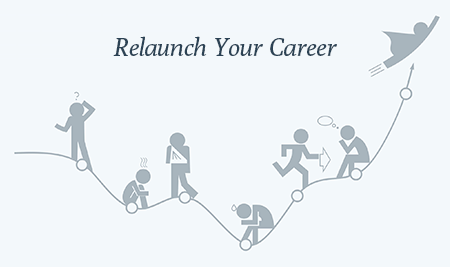So you’ve decided the time has come to make a career change. You’ve gone from wondering if you’re in the right job to realizing you’re very unhappy. You may have tried to stick things out, only to run out of steam. After realizing you have your limits, you decided to resign from your old job, to give yourself some space and time to reflect on what you want next for your career and life.
Now, it’s time to begin the next chapter of your career. To relaunch your career.
Relaunching your career is the final stage in the 7 Stages of Career Change. This marks the end of one journey, but it really is only just the beginning of what will hopefully be a more meaningful period in your career and life. Make no mistake, this marks very exciting moment in your career when you pivot from one job to another. Making the decision to move on is half the battle.
At the same time, this pivot point is often riddled with anxiety. One of the things I hear most often from people changing careers is that they’re worried about making the same mistake again. Of ending up in another job or another profession where they feel unfulfilled. And that worry can be paralyzing. It can lead to a tremendous amount of analysis paralysis, where trying to make the perfect move gets in the way of making a reasonably good move.
If you don’t know exactly where to go from here, you’re not alone. Many people I know who have successfully relaunched their careers, including me, did not have everything perfectly mapped out once they began that new chapter.
Moving away from what you don’t want is just the start of an ongoing journey to figure out what you do want.
There’s no single right way to relaunch your career
In spite of all the advice that’s out there, when you’re trying to do something unconventional, conventional wisdom doesn’t often hold.
Over the past three years since leaving my corporate job behind to focus on career change consulting, I’ve crossed paths with hundreds of people during turning points in their careers. I’ve heard their career stories, struggles, aspirations, failures, and success stories. I’ve spent time with people who have navigated the process of changing industries, job functions, roles, or geography. Some decided to leave the comforts of a steady pay check behind to start their own businesses. Others have returned to school.
Throughout these conversations, I’ve been reminded everyone’s career journey is very unique. I’m constantly reminded how hard making a career change is. It’s incredibly difficult. Many people I speak to who initially had aspirations of making a change end up reverting back to work they don’t necessarily love, but can tolerate. Or they make a change so incremental they don’t feel a major difference.
However, some people do manage to pull off a major career change.
So how do they do it?
I’ve observed a few common behaviors that distinguish people who are able to successfully relaunch their careers from those who are not.
I’ve also spent a lot of time reflecting on which of my own behaviors enabled me to successfully pull off my own career changes—when I moved from a career in medicine to business. When I went from being a health policy consultant to landing a brand marketing role at a leading consumer goods company. When I left my life in the US behind to restart my career in the UK, quickly securing a role promotion in a new geography, sector, and company type. And when I shifted from being a manager at a global corporation to launching my own small business three years ago.
To help you set a strong foundation for your own career change, I’d like to share 3 behaviors that have served me and others especially well during times of reinvention.
1) Focus on action, not excess analysis
 I like to reflect on stuff. A lot. For much of my career in the corporate world, my ability to analyze was an asset. However, during the transitions I’ve had in my career, I’ve found that endless analysis doesn’t actually get me anywhere.
I like to reflect on stuff. A lot. For much of my career in the corporate world, my ability to analyze was an asset. However, during the transitions I’ve had in my career, I’ve found that endless analysis doesn’t actually get me anywhere.
Trying to come up with the perfect solution just leaves me feeling paralyzed and stationary. On the other hand, taking a leap in a direction that felt broadly right actually led to concrete progress.
An example is when I took a corporate consulting job in Washington, DC after dropping out of medical school even though I didn’t know exactly where it was going to lead me. This move wasn’t anywhere close to what I would call perfect. But it helped me move forward in a direction that was broadly right and figure out what I did and did not enjoy. It also planted the seeds to my eventual career in brand management and now personal branding.
As uncomfortable as it may have felt, when I forced myself to take action, even an imperfect action, I made concrete progress with my career change.
Taking broadly correct actions is something I observe amongst people who manage to successfully reinvent themselves. They don’t try to check all the boxes on all the criteria they’re trying to meet. They simply try to take steps that feels right enough.
They take a role that has at least a couple exciting parts to it. They move into an industry that seems broadly interesting. They launch that beta product even if it’s not completely polished. They serve someone who’s not their ideal client, but a solid client. Moving forward in a direction that’s broadly right can be more productive then trying to formulate a perfect solution.
2) Be unapologetically untraditional
 In the past, I’ve been guilty of allowing judgement to affect mer. Not even actual judgement, but the potential judgement from peers and colleagues, especially during times of career transition. “What will people think of me?” is definitely a question that’s hovered over my head more than it probably should.
In the past, I’ve been guilty of allowing judgement to affect mer. Not even actual judgement, but the potential judgement from peers and colleagues, especially during times of career transition. “What will people think of me?” is definitely a question that’s hovered over my head more than it probably should.
I’ve felt especially “exposed” during those moments in my professional life when I’ve quit a job without having another one lined up. Or when I’ve stepped away from ladder climbing in the corporate world to launch my own business. Doing something unconventional can feel incredibly uncomfortable and risky.
I’ll give you an example. When I left my brand management job behind in the US to move to the UK, it created a gap in my resume. I knew this might raise red flags with hiring managers. So when I first started interviewing for roles in the UK, I caught myself feeling quite defensive, apologetic, and insecure whenever explaining this unconventional transition in my career—why I left before getting promoted, why I suddenly moved to the UK, why now?
I quickly realized I was shooting myself in the foot. I was “self-sabotaging” by getting wrapped up in over-explaining this transition that wasn’t really a big deal to others. No one was as hung up on this transition as I was.
So I eventually started to embrace my unique story. I talked about how my experiences at a blue-chip household goods company in the US would give me a unique perspective at a UK food start-up. I said being a newcomer to the UK would help me understand the consumer market with a fresh, unbiased view.
By definition, if you’re a career changer, you’ve had past experiences that aren’t as obviously connected with their future ambitions. Other people may naturally struggle to connect the dots in your past or make sense of how your former experiences are relevant.
The career changers who do manage to connect the dots for people seem to get along okay.
Here’s the trick though. The first person you have to convince of your value is yourself. You have to get to a place where you believe your past experiences, no matter how disparate or seemingly unconventional, are valuable and relevant to your future career path. Then, you have to unabashedly market who you are to others. I’m not saying enthusiasm alone seals the deal across all situations, but it sure can make a big difference between someone wanting to take a chance on you or not.
3) Use lasers, not floodlights
 During my first year after college, I had 7 different jobs in the span of two years–English teacher, waiter in Old Spaghetti Factory (I only lasted a day), news anchor, life insurance salesperson, Banana Republic sales associate, PR assistant, and even an office temp.
During my first year after college, I had 7 different jobs in the span of two years–English teacher, waiter in Old Spaghetti Factory (I only lasted a day), news anchor, life insurance salesperson, Banana Republic sales associate, PR assistant, and even an office temp.
Very early on in my career, I was guilty of using a “floodlight,” which I define as taking a very open, broad approach to exploring opportunities. For example, sending a blast email out to a ton of prospective employers. Or copy & pasting a standard letter and posting it to a bunch of online job openings. I refer to anything that involves somewhat indiscriminate, unfocused career exploration as a “floodlight search.”
I’ve engaged in this tactic before. I suppose a floodlight search makes you feel like you’re doing something, but the reality is, you rarely find meaningful roads forward.
Conversely, using a “laser” is when you take a very focused, targeted approach to uncovering opportunities. Kind of like how marketers get very specific with the type of target audience they’re trying to reach.
Recently, when I started my own career consultancy, I specifically honed in on the space of personal branding in the context of career change. I did not broadcast that I covered other areas of coaching. I rarely referred to myself as a “life coach.”
When I have forced myself to use targeted “lasers” instead of “spotlights” in my career, I gained more traction.
This idea of being extremely targeted feels somewhat paradoxical. You can feel like you’re ruling yourself out of opportunities. It can feel uncomfortably narrow.
However, being focused tends to work. Being laser focused in a handful of areas is different than trying to blanket everything out there. When you try to be everything to everyone, you tend to stand out to no one. But when you get very targeted and in the types of opportunities you pursue, you will hopefully at least stand out to someone who matters.
Do your best to just begin somewhere
 I’m is guilty as anyone of letting my desire to find the perfect solution get in the way of me pursuing a “good-enough” solution to begin the next chapter of my career. No one wants to make a mistake. Not again. Especially if you’ve just gone through an emotional ride with your last job. No one wants to make a move that will damage their long term career either.
I’m is guilty as anyone of letting my desire to find the perfect solution get in the way of me pursuing a “good-enough” solution to begin the next chapter of my career. No one wants to make a mistake. Not again. Especially if you’ve just gone through an emotional ride with your last job. No one wants to make a move that will damage their long term career either.
But at some point, you have to just start.
Starting is definitely the hardest part. No matter how long you deliberate, no matter how long you try to formulate a plan, you will still have to start somewhere and sometime. So you might as well start now and just take your best shot at what will serve you reasonably well in opening up the next opportunity in your career.
Start the next chapter of your career
If you’re struggling to figure out what to do next, you can download my free “4 ways to start taking action” worksheet to help you begin the next chapter of your career. (These are all things I’ve done that have helped me).




Hi Joseph:
Great post! Career change, starting a new business is not easy. I love a statement ”the first person you have to convince of your value is yourself”.
Thank you for sharing.
Regards,
Matea
Matea, I’m really happy to hear you enjoyed this post. No, starting a business is definitely not easy. I’d imagine if it was, everyone who felt like doing it would do it! I’ve definitely found we are our own toughest critics along the way. Best of luck to you with your own journey.